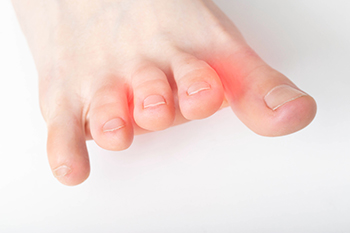
Morton’s neuroma is a painful foot condition that affects women more than men. It may develop from frequently wearing high heels and occurs in the nerve between the third and fourth toes. Many high heels do not have adequate room for the toes to move freely in and this can cause the nerve to become compressed. Common symptoms associated with Morton’s neuroma can include the sensation of stepping on a pebble or marble, numbness, or stabbing pain surrounding the affected area. Relief may be found when the foot is elevated and when soft insoles are worn inside the shoe. Patients who are overweight are encouraged to lose any additional weight to help reduce the pressure on the feet. It is also suggested to refrain from participating in running and jumping activities, and this may help accelerate the healing process. In severe cases, surgery may be required to permanently repair or remove the affected nerve for maximum comfort. If you have this foot condition, please consult a podiatrist who can effectively diagnose and treat Morton’s neuroma.
Morton’s neuroma is a very uncomfortable condition to live with. If you think you have Morton’s neuroma, contact one of our podiatrists of Comprehensive Foot & Ankle Centers. Our doctors will attend to all of your foot care needs and answer any of your related questions.
Morton’s Neuroma
Morton's neuroma is a painful foot condition that commonly affects the areas between the second and third or third and fourth toe, although other areas of the foot are also susceptible. Morton’s neuroma is caused by an inflamed nerve in the foot that is being squeezed and aggravated by surrounding bones.
What Increases the Chances of Having Morton’s Neuroma?
- Ill-fitting high heels or shoes that add pressure to the toe or foot
- Jogging, running or any sport that involves constant impact to the foot
- Flat feet, bunions, and any other foot deformities
Morton’s neuroma is a very treatable condition. Orthotics and shoe inserts can often be used to alleviate the pain on the forefront of the feet. In more severe cases, corticosteroids can also be prescribed. In order to figure out the best treatment for your neuroma, it’s recommended to seek the care of a podiatrist who can diagnose your condition and provide different treatment options.
If you have any questions, please feel free to contact our offices located in Shepherdsville and Louisville, KY . We offer the newest diagnostic and treatment technologies for all your foot care needs.
